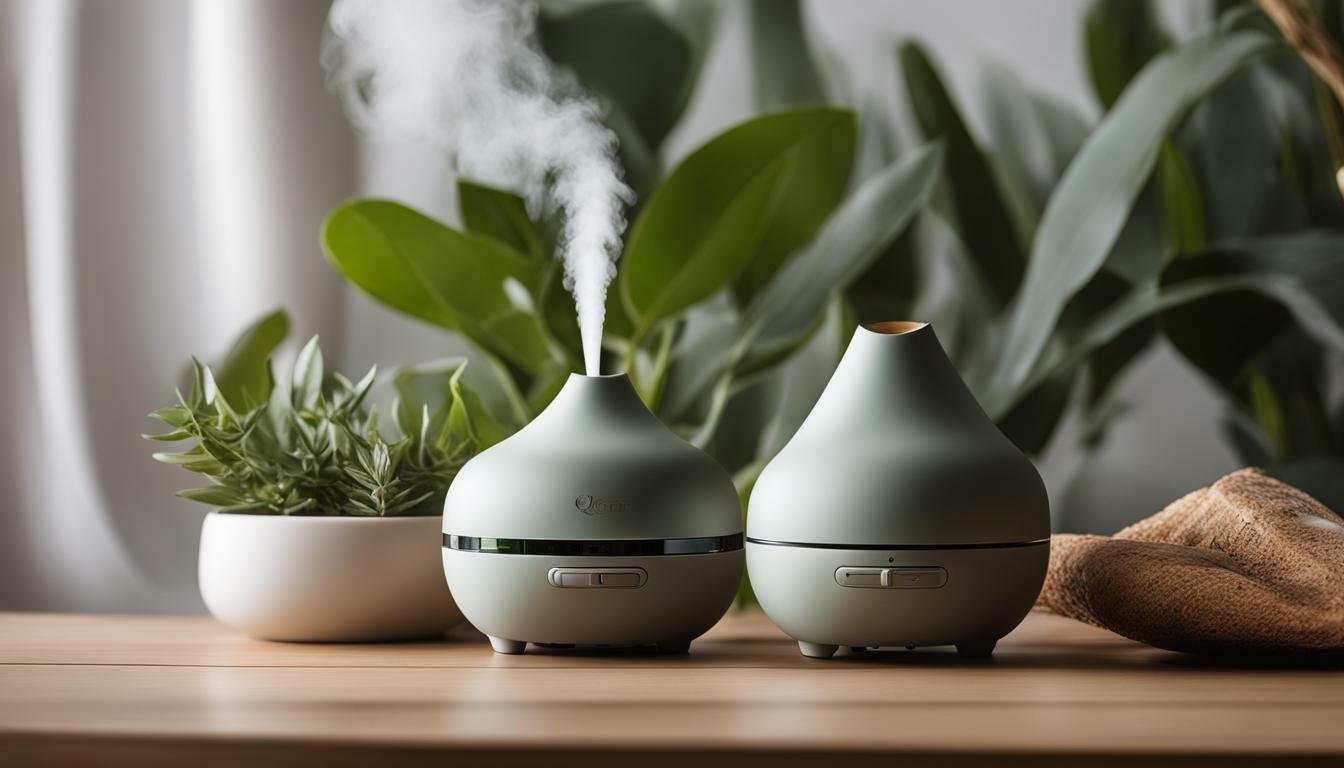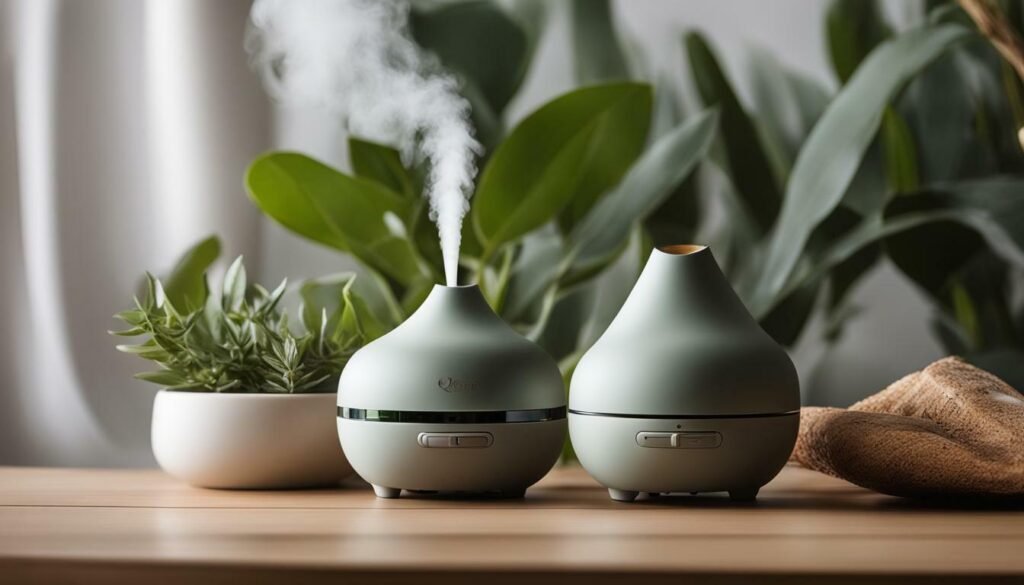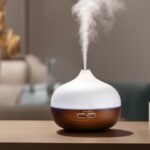
Where we will explore the benefits of using a eucalyptus oil diffuser for natural aroma therapy.
Aroma therapy has long been recognized for its ability to promote relaxation, improve sleep quality, and elevate mood. By harnessing the power of essential oils, you can create a soothing and invigorating environment in the comfort of your own home.
One essential oil that stands out for its numerous benefits is eucalyptus oil. Known for its refreshing scent and therapeutic properties, eucalyptus oil has been used for centuries to alleviate respiratory issues and muscle pain.
In this comprehensive guide, we will walk you through everything you need to know about using an essential oil diffuser, with a particular focus on the benefits and versatility of eucalyptus oil. From understanding how to use a diffuser effectively to exploring the best essential oils to diffuse, this guide will equip you with the knowledge to enhance your well-being and embrace the wonders of aroma therapy.
So, whether you are a novice or a seasoned aroma therapy enthusiast, join us on this aromatic journey as we unlock the therapeutic potential of your eucalyptus oil diffuser.
The Power of Eucalyptus Oil: Respiratory Health and Beyond
Eucalyptus oil is an essential oil that possesses remarkable properties, providing numerous health benefits, especially when it comes to respiratory issues and muscle pain relief. This versatile oil has been used for centuries for its healing properties and is a must-have addition to any essential oil collection.
When it comes to respiratory health, eucalyptus oil works wonders. Its natural antibacterial and anti-inflammatory properties can help alleviate symptoms of respiratory conditions such as colds, coughs, sinusitis, and bronchitis. Inhaling the soothing aroma of eucalyptus oil can help open up the airways, reduce congestion, and promote easier breathing. Whether diffused in an essential oil diffuser or added to a steam inhalation, eucalyptus oil can provide much-needed relief to those suffering from respiratory issues.
Not only does eucalyptus oil benefit the respiratory system, but it also offers relief to those experiencing muscle pain and discomfort. Its analgesic and anti-inflammatory properties can help ease muscle aches, joint pain, and tensions. By massaging diluted eucalyptus oil onto the affected areas or using it in a bath soak, individuals can experience a soothing and relaxing effect on their muscles.
| Benefits of Eucalyptus Oil: |
|---|
| – Alleviates respiratory issues |
| – Relieves muscle pain and discomfort |
| – Promotes easier breathing |
| – Reduces congestion |
| – Provides natural antibacterial properties |
| – Offers anti-inflammatory benefits |
Whether you’re looking to improve your respiratory health or seeking relief from muscle pain, harnessing the power of eucalyptus oil can be a game-changer. Its natural properties, combined with the convenience of essential oil diffusers, make it easy to incorporate into your daily routine for enhanced well-being and overall relaxation.
How to Use an Essential Oil Diffuser: Enjoying the Aromas
Using an essential oil diffuser is a simple and effective way to enjoy the therapeutic benefits of eucalyptus oil and other essential oils. Whether you want to create a relaxing atmosphere, improve your sleep, or find relief from respiratory issues, a diffuser can help enhance your well-being.
To start, fill your diffuser with clean, preferably filtered water. The amount of water needed will depend on the size of your diffuser, so be sure to follow the instructions provided by the manufacturer. Once the water is in place, add a few drops of your chosen essential oil, such as eucalyptus oil, to the water reservoir.
Next, adjust the settings on your diffuser to suit your preferences. Most diffusers have options for continuous or intermittent misting, as well as adjustable mist intensity. Experiment with different settings to find the right balance for you. It is important to note that essential oils are highly concentrated, so start with a small amount and adjust as needed.
As the diffuser begins to release the mist and aroma, take a moment to inhale deeply and enjoy the soothing scents. Close your eyes, relax your body, and let the calming properties of the essential oils envelop your senses. Repeat this ritual whenever you need a moment of tranquility or want to benefit from the specific properties of certain oils.
| Essential Oil | Aroma | Benefits |
|---|---|---|
| Eucalyptus | Refreshing, minty | Clears congestion, improves breathing |
| Lavender | Floral, calming | Promotes relaxation, reduces anxiety |
| Peppermint | Minty, invigorating | Relieves headaches, boosts energy |
Remember to clean your diffuser regularly to prevent the buildup of residue and ensure optimal performance. Refer to the manufacturer’s instructions for specific cleaning recommendations. With proper care and maintenance, your essential oil diffuser will continue to provide you with a delightful aromatherapy experience.
Exploring Essential Oil Options: Best Oils to Diffuse
When it comes to essential oils, the options are vast. In this section, we explore the best oils to diffuse in order to enhance your aroma therapy experience and specifically focus on the benefits of eucalyptus oil.
One of the top choices for essential oil enthusiasts is eucalyptus oil. Known for its invigorating and refreshing scent, eucalyptus oil offers a wide range of benefits for both the body and mind. Not only does it promote respiratory health by clearing the airways and improving breathing, but it also has a soothing effect on muscle pain and discomfort.
In addition to eucalyptus oil, there are several other essential oils that work well in diffusers. Lavender oil, for example, is renowned for its calming and relaxing properties, making it an excellent choice for those seeking stress relief and better sleep. Peppermint oil is another popular option, known for its energizing and invigorating effects. It can help improve focus and concentration, making it a great oil to diffuse during work or study sessions.
| Essential Oil | Benefits |
|---|---|
| Eucalyptus Oil | Promotes respiratory health, relieves muscle pain |
| Lavender Oil | Calming and relaxing, aids sleep |
| Peppermint Oil | Energizing and invigorating, improves focus |
Combining Essential Oils
For a truly personalized aroma therapy experience, consider combining different essential oils in your diffuser. The possibilities are endless, allowing you to create unique blends to suit your mood and specific needs. Some popular combinations include eucalyptus and peppermint for a refreshing and energizing blend, or lavender and chamomile for a calming and peaceful ambiance.
Remember to always choose high-quality essential oils from reputable sources to ensure maximum benefits. Experiment with different combinations and ratios to discover your favorite scent combinations and enjoy the therapeutic effects of aromatherapy.
Maintaining Your Diffuser: Cleaning Tips and Tricks
Proper maintenance and cleaning of your essential oil diffuser are essential for ensuring its longevity and maximizing its performance. Regular cleaning prevents the buildup of residue and ensures that your diffuser continues to disperse the therapeutic aromas effectively. Here are some helpful tips and tricks to keep your diffuser in pristine condition:
- Follow the manufacturer’s instructions: Every diffuser is unique, so it’s important to refer to the instruction manual for specific cleaning guidelines. This will help you understand the recommended cleaning frequency and any specific cleaning solutions or techniques to use.
- Use vinegar for deep cleaning: To remove any stubborn residue or oil buildup, dilute white vinegar with water (1:1 ratio) and use it to clean the diffuser. Simply fill the water tank with the vinegar solution, run the diffuser for a few minutes, and then empty and rinse thoroughly. Vinegar is a natural cleanser that effectively breaks down oils and leaves your diffuser fresh and clean.
- Regularly wipe down the exterior: While cleaning the interior of the diffuser is important, don’t forget to clean the exterior as well. Use a soft cloth or damp sponge to wipe away any dust or oil residue that may have accumulated on the surface of the diffuser.
Additional Tips:
- Be gentle with delicate parts: When cleaning the diffuser’s components, such as the atomizer or ceramic disc, handle them with care. These parts are delicate and can be easily damaged if not handled properly.
- Regular maintenance routine: Make cleaning your diffuser a part of your regular maintenance routine. A simple wipe down after each use and a deeper clean every 1-2 weeks will help keep your diffuser running smoothly and ensure the purity of the aromas.
| Tip | Frequency |
|---|---|
| Wipe down exterior | After each use |
| Deep clean with vinegar | Every 1-2 weeks |
With these cleaning tips and tricks, you can maintain the performance and longevity of your essential oil diffuser. Regular maintenance not only ensures that your diffuser continues to disperse the therapeutic aromas effectively but also enhances your overall aromatherapy experience.
Conclusion
In conclusion, incorporating a eucalyptus oil diffuser into your wellness routine can greatly enhance your overall well-being through the power of aroma therapy. Eucalyptus oil is a must-have addition to your essential oil collection, offering numerous benefits for respiratory issues and muscle pain.
By using an essential oil diffuser, you can easily enjoy the therapeutic effects of eucalyptus oil. Simply add water and a few drops of eucalyptus oil to your diffuser, adjust the settings to your preference, and let the soothing aromas fill your space. Whether you are looking to improve your breathing or alleviate muscle discomfort, the diffuser allows you to experience the full potential of eucalyptus oil.
Furthermore, the world of essential oils is vast, with various options available for different purposes. While eucalyptus oil shines in its versatility and compatibility with other oils, it is always beneficial to explore other options that cater to your specific needs. Whether you are seeking relaxation, focus, or energy, there is an essential oil that can enhance your diffusing experience.
Lastly, proper maintenance of your essential oil diffuser is crucial for optimal performance. Regular cleaning and care ensure that your diffuser functions smoothly and lasts long. By following simple cleaning tips and tricks, you can enjoy the benefits of your eucalyptus oil diffuser for a long time to come.
FAQ
Can I use eucalyptus oil in any type of essential oil diffuser?
Yes, eucalyptus oil can be used in most types of essential oil diffusers, including ultrasonic, nebulizer, and heat diffusers. Just make sure to follow the specific instructions provided by the manufacturer of your diffuser.
How much eucalyptus oil should I add to my diffuser?
The amount of eucalyptus oil to add to your diffuser depends on the size of your diffuser and personal preference. As a general guideline, start with 3-5 drops of eucalyptus oil per 100ml of water and adjust as desired. Remember, a little goes a long way when it comes to essential oils.
Can eucalyptus oil help with allergies?
Yes, eucalyptus oil is known for its anti-inflammatory and decongestant properties, which can help alleviate symptoms of allergies such as nasal congestion and respiratory discomfort. It is important to use high-quality, pure eucalyptus oil and consult with a healthcare professional if you have any underlying medical conditions.
How often should I clean my essential oil diffuser?
It is recommended to clean your essential oil diffuser after every 5-6 uses or at least once a week. Regular cleaning helps prevent the buildup of residue and ensures that your diffuser functions optimally. Refer to the manufacturer’s instructions for specific cleaning guidelines.
Can I mix eucalyptus oil with other essential oils?
Absolutely! Eucalyptus oil blends well with a variety of other essential oils, such as lavender, peppermint, lemon, and tea tree. Experiment with different combinations to create your desired aroma and therapeutic benefits. Always dilute essential oils properly and research any potential contraindications before blending.







